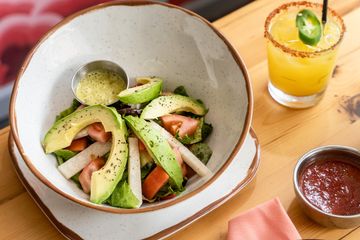Is Mexican Food Healthy? Unpacking the Nutritional Advantages of Conventional Ingredients
The question of whether Mexican food is healthy and balanced invites an expedition of its standard active ingredients. Beans and corn function as fundamental staples, abundant in healthy protein and fiber. Avocados supply beneficial fats, while numerous natural herbs and flavors add taste and health benefits - hand crafted margarita. Together, these components produce a tapestry of nourishment. The healthiness of Mexican cuisine commonly depends on prep work approaches and section dimensions. What duty do these variables play in identifying its total dietary worth?
The Power of Beans: Protein and Fiber-Rich Staples
Although frequently forgotten, beans serve as a cornerstone of Mexican cuisine, supplying a riches of nutritional benefits. Rich in healthy protein, they are an excellent plant-based choice for those seeking to satisfy their dietary protein needs. This high healthy protein material supports muscle mass repair service and growth, making beans indispensable for both vegetarians and meat-eaters alike. Additionally, beans are an outstanding resource of nutritional fiber, which aids in digestion and promotes a sensation of volume, potentially aiding with weight monitoring.
The range of beans utilized in Mexican dishes, such as black beans, pinto beans, and kidney beans, adds to a diverse taste account and can improve meals nutritionally. Beans are reduced in fat and include vital vitamins and minerals, including folate, iron, and magnesium. Together, these attributes make beans a crucial ingredient, supplying both nutrients and nutrition in traditional Mexican price.

Corn: a Versatile Grain With Nutritional Benefits
Corn stands out as a flexible grain essential to Mexican food, celebrated not just for its cooking applications however additionally for its impressive nutritional profile. As a main active ingredient in dishes like tortillas, tamales, and pozole, corn gives vital nutrients that add to a balanced diet. Rich in carbs, it functions as a substantial energy source, while additionally being low in fat, making it a desirable option for different nutritional requirements.
Moreover, corn is an excellent resource of dietary fiber, which helps in digestion and promotes satiation. It includes substantial amounts of vitamins such as B-complex vitamins, which are crucial for energy metabolic rate. The presence of anti-oxidants, specifically carotenoids, adds to total health and wellness by reducing oxidative anxiety. In addition, corn is gluten-free, accommodating those with gluten sensitivities. Generally, the nutritional advantages of corn emphasize its importance in traditional Mexican food and its role in a healthy diet regimen.
Avocados: Healthy And Balanced Fats and Nutrients in Every Bite
Avocados play a substantial function in Mexican food, complementing meals with their velvety texture and rich taste. Past their culinary allure, avocados are celebrated for their outstanding nutritional profile. They are an abundant source of healthy monounsaturated fats, which can aid lower negative cholesterol degrees and support heart health. In addition, avocados are packed with crucial nutrients, consisting of potassium, vitamin E, and B vitamins, adding to overall wellness.
The high fiber material in avocados aids digestion and promotes satiety, making them a helpful addition to any type of meal. Their distinct nutrient make-up can also support skin health and offer anti-inflammatory benefits. Incorporating avocados right into typical Mexican meals or enjoying them as a standalone snack can boost both flavor and nourishment, demonstrating why they are a cherished staple in Mexican cuisine. In general, avocados offer a tasty method to appreciate healthy fats and important nutrients in every bite.

Herbs and flavors: Flavorful Health And Wellness Boosters
While enjoying the rich flavors of Mexican cuisine, one can not overlook the important role that spices and herbs play in improving both taste and health and wellness. Active ingredients such as cilantro, oregano, and chili peppers not just add to the vibrant taste profile however likewise offer substantial health benefits. Cilantro is understood for its detoxing homes, assisting to get rid of heavy steels from the body, while oregano is loaded with antioxidants and has anti-inflammatory impacts.
Chili peppers, a staple in lots of Mexican recipes, contain capsaicin, which has actually been connected to boosted metabolic process and discomfort relief. In addition, spices like cumin and coriander support food digestion and might aid in blood sugar guideline. Including these savory wellness boosters right into meals not just enhances the culinary experience but also advertises total health, making Mexican food not simply scrumptious, yet likewise nutritionally helpful.
Conventional Food Preparation Techniques: Enhancing Nutrition and Flavor
Traditional cooking approaches in Mexican cuisine play a necessary role in improving both nourishment and flavor, as they usually prioritize time-honored techniques and fresh ingredients. Strategies such as nixtamalization, where corn is saturated and prepared in an alkaline solution, not just boost the nutrient profile of tortillas yet likewise enhance their digestibility - tacos. Additionally, the use of slow-moving food preparation methods, like cooking or braising, allows tastes to meld magnificently while maintaining the honesty of the components

Frequently Asked Concerns
Are Mexican Food Portions Commonly Larger Than Various Other Cuisines?
Mexican food parts are typically bigger than those of lots of other foods. This characteristic mirrors standard dining techniques, highlighting common sharing and hearty meals, which can lead to a much more substantial offering size overall.
Exactly how Does the Preparation Technique Affect Healthfulness of Mexican Food?
Preparation techniques considerably influence the healthfulness of Mexican food. Techniques such as barbecuing or steaming preserve nutrients, while frying can boost harmful fat content. Selections of components and cooking designs eventually determine general nutritional worth.
Can Mexican Food Be Tailored for Particular Nutritional Constraints?
Mexican food can without a doubt be tailored for certain nutritional limitations. Substitutions, such as utilizing corn tortillas for gluten-free diet regimens or incorporating even more veggies, make it visit this site right here possible for individuals to appreciate traditional flavors while accommodating numerous dietary demands.
What Are Typical Misunderstandings Regarding Mexican Food and Health?
Common mistaken beliefs regarding Mexican food include the belief that it is inherently harmful, extremely hot, and exclusively concentrated on fats. In truth, conventional meals frequently include nourishing ingredients and can be tailored to different dietary needs.
Are There Healthier Choices at Mexican Dining Establishments?
Much healthier alternatives at Mexican dining establishments usually consist of smoked meats, beans, and fresh veggies. Picking recipes that stress entire ingredients and avoiding hefty sauces can lead to a much more healthy dining experience, promoting total wellness.
The selection of beans utilized in Mexican dishes, such as black beans, pinto beans, and kidney beans, adds to a varied taste account and can improve meals nutritionally. Avocados play a considerable role in Mexican food, complementing recipes with their luscious appearance and abundant flavor. Incorporating avocados right into typical Mexican recipes or appreciating them as a standalone snack can boost both flavor and nourishment, demonstrating why they are a precious staple in Mexican food. While taking pleasure in the abundant flavors of Mexican cuisine, one can not from this source forget the crucial role that spices and natural herbs play in boosting both preference and health. Traditional cooking approaches in Mexican food play a vital role in boosting both nourishment and flavor, as they commonly focus on classic methods and fresh ingredients.